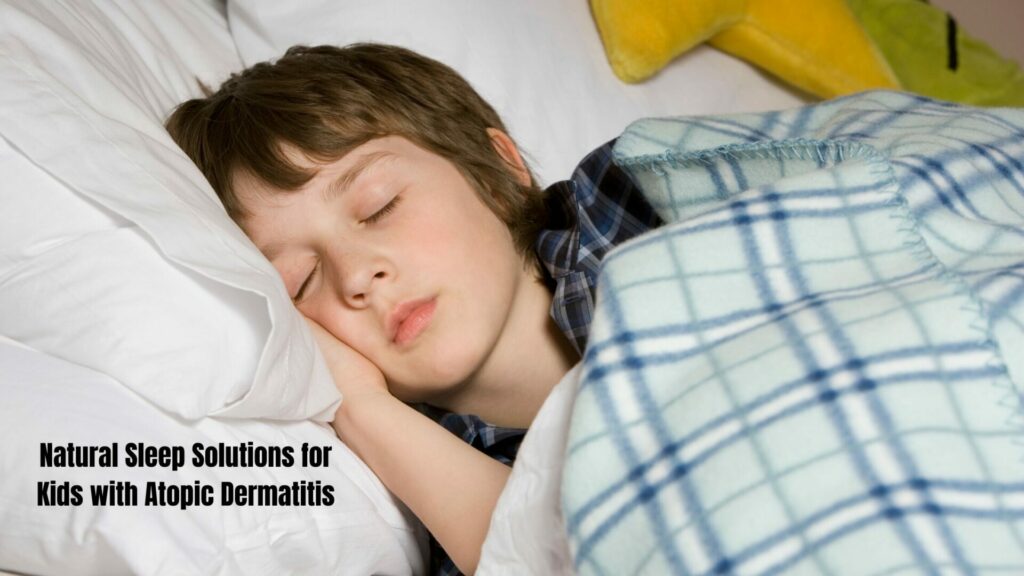
Sleep is vital for children’s overall health and development, yet for many, especially those with atopic dermatitis (AD), achieving restful nights can be a significant challenge. Studies indicate that up to 87% of children aged 2 to 10 with AD experience sleep disruptions, primarily due to intense itching. This article explores Ayurvedic remedies while addressing whether sleep medicines for kids with atopic dermatitis are a suitable option.
Understanding Atopic Dermatitis and Its Impact on Sleep
Atopic dermatitis is a chronic inflammatory skin condition characterized by dry, itchy, and inflamed skin. For many children, the condition worsens at night, leading to restless sleep and fatigue during the day.
Children generally have shorter sleep cycles, averaging about one hour, compared to adults, who have cycles lasting 90 minutes to two hours. This means they wake more frequently, particularly when itching flares up. The constant cycle of itching and waking can leave parents searching for solutions, including sleep medicines.
The Importance of Sleep for Children
Sleep is essential for physical growth, cognitive development, and emotional well-being. Poor sleep can lead to irritability, reduced attention span, and decreased academic performance. Therefore, addressing sleep issues in children with atopic dermatitis is crucial.
Real-Life Example: Riya’s Journey with Atopic Dermatitis
Let’s consider Riya, a 5-year-old girl from Mumbai who has struggled with atopic dermatitis since infancy. Riya’s condition worsens during the humid monsoon season and the dry winter months. Her mother, Aditi, noticed that Riya scratched persistently after falling asleep, leading to many sleepless nights.
Last winter, the situation became particularly dire. Aditi shared, “I would hear Riya scratching and wake up to find her in tears. She often ended up in my bed because she couldn’t find comfort alone.” The combination of sleeplessness and frustration left both mother and daughter exhausted.
When they consulted their pediatrician, the suggestion of a sleep medicine was met with hesitation. Aditi was concerned about the potential side effects and long-term impact on Riya’s health. Instead, she began to explore Ayurvedic remedies, feeling they could offer a safer alternative.
Ayurvedic Approaches to Managing Atopic Dermatitis and Sleep
Ayurveda, an ancient Indian system of medicine, offers a holistic approach to health that focuses on balancing the body, mind, and spirit. For children with atopic dermatitis, several Ayurvedic remedies can promote skin health and improve sleep quality.
1. Herbal Infusions
Herbal remedies have been used in Ayurveda for centuries. One popular option is:
- Turmeric Milk: Known for its anti-inflammatory and antioxidant properties, a warm glass of milk mixed with a pinch of turmeric and a bit of honey before bedtime can help soothe the body and promote relaxation. Turmeric helps reduce inflammation, which may alleviate some symptoms of atopic dermatitis.
2. Moisturizing Baths
Bathing is an essential part of Ayurvedic practices. Adding specific oils and ingredients can enhance the experience:
- Coconut Oil Baths: Coconut oil is renowned for its moisturizing properties. Adding a few tablespoons of coconut oil to a warm bath can help hydrate the skin and reduce irritation. The oil’s fatty acids also provide anti-inflammatory benefits, making it particularly beneficial for children with AD.
3. Soothing Oils for Application
Ayurvedic oils can be applied directly to the skin to alleviate dryness and itching:
- Neem and Aloe Vera: A mixture of neem oil and aloe vera gel can be applied to affected areas before bedtime. Neem possesses potent antimicrobial properties, while aloe vera helps soothe inflamed skin, reducing itching and discomfort. This combination can create a protective barrier and enhance skin hydration.
4. Calming Bedtime Rituals
Establishing a bedtime routine can significantly impact sleep quality. Incorporate calming practices such as:
- Gentle Yoga and Meditation: Engaging in gentle stretches and mindfulness exercises can help your child unwind and prepare for sleep. Simple yoga poses, such as Child’s Pose or Legs-Up-the-Wall, promote relaxation and may ease anxiety associated with bedtime.
5. Ayurvedic Dietary Practices
What your child eats can affect their skin condition and sleep quality. Ayurveda emphasizes the importance of a balanced diet:
- Incorporating Cooling Foods: Foods like cucumber, watermelon, and coconut can help cool the body from within, reducing inflammation and discomfort during the night. Encouraging your child to eat these foods, especially during flare-ups, can be beneficial.
To further enhance your child’s skin health, explore how nutrition plays a vital role in our post on Nutritionists Recommend These Foods For Skin Nourishment.
Are Sleep Medicines a Suitable Option?
If considering sleep medicines for kids with atopic dermatitis, it’s crucial to consult a healthcare professional first. While some medications may help improve sleep, they should be approached with caution.
Common Sleep Medicines and Their Use
- First-Generation Antihistamines: Medications such as diphenhydramine (Benadryl) may assist some children in sleeping. However, parents should be aware of potential side effects, including hyperactivity or drowsiness the following day.
- Melatonin: This natural hormone can aid sleep onset and has shown promise in some studies regarding its use in children with atopic dermatitis. However, it should be used cautiously and discussed with a doctor, especially in young children.
Potential Risks and Side Effects
Before opting for sleep medicines, it’s essential to understand the risks:
- Drowsiness: While these medicines can assist with sleep initiation, they may lead to excessive drowsiness and affect daily functioning.
- Skin Effects: Some antihistamines can have a drying effect on the skin, potentially exacerbating conditions like atopic dermatitis.
Key Discussions with Your Pediatrician
When addressing sleep issues linked to atopic dermatitis, discuss the following with your child’s healthcare provider:
- Managing Itching: Effective management of itching is crucial. Focus on comprehensive treatment plans, including topical treatments, to alleviate discomfort.
- Ayurvedic Integration: Talk about incorporating Ayurvedic practices into the treatment plan. Highlight natural remedies that promote skin health and improve sleep quality without the side effects associated with pharmaceuticals.
For additional expert insights, check out Dr. Pretty’s perspective on children’s skincare in this article, Skincare for Kids: Why Less is More From a Dermatologist’s Perspective!
Additional Ayurvedic Remedies to Consider
Beyond the basics, here are more Ayurvedic practices to support children with atopic dermatitis and sleep issues:
- Ghee: Incorporating ghee (clarified butter) into your child’s diet can provide nourishment and hydration. Its rich fatty acid profile can help maintain skin moisture levels.
- Essential Oils: Oils like lavender or chamomile can promote relaxation. A few drops in a diffuser or added to a warm bath can create a calming environment conducive to sleep.
- Ashwagandha: Known as a powerful adaptogen, ashwagandha can help manage stress and promote relaxation. Consult a healthcare provider for appropriate dosages for children.
Conclusion
In conclusion, while sleep medicines for kids with atopic dermatitis may offer some relief, they should be approached with caution and under medical guidance. Exploring Ayurvedic remedies provides holistic solutions that address both skin health and sleep quality.
By prioritizing natural treatments and maintaining an open dialogue with healthcare providers, parents can create a supportive environment for their children to enjoy restful, rejuvenating sleep.
As you navigate this journey, remember that every child is unique, and what works for one may not work for another. With patience and persistence, you can find the best approach for your child’s needs.



